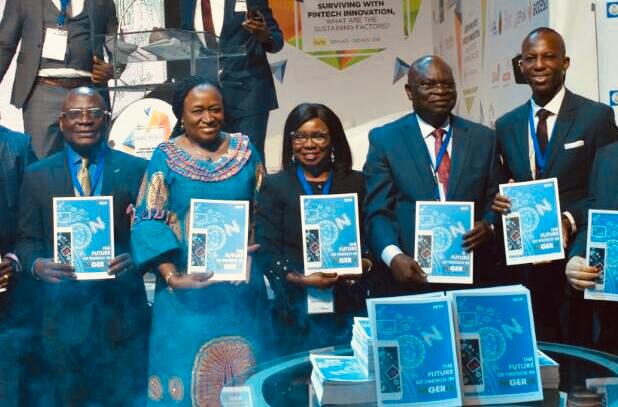Acting Director-General of Nigeria’s Securities and Exchange Commission (SEC), Ms. Mary Uduk, on Tuesday stressed the need for expanded access to finance, providing new ways to raise funding, enhance financial inclusion and foster increased participation in the capital market.
Uduk, who was speaking at the official launch of the Fintech Roadmap of the capital market, as part of the Nigerian Fintech week in Lagos, noted the huge prospects in the global FinTech sector, which is growing at an incredible rate of 200% year-on-year.
The Roadmap, she noted, sees collaboration as a key ingredient for deepening market penetration, following which she called for a strategic alliance among regulators and other stakeholders within the ecosystem.
The Acting DG expressed confidence “that together, we can surmount the challenges inherent and seize the potentials of FinTech to transform people’s lives for the better.
“It is our belief that this policy document will broaden the robust conversation and engagements within the ecosystem, encourage responsible use of new technologies and digital finance in the capital market, influence increased international participation and cooperation, and also provide investors with more choices in the Nigerian Capital Market.”
The SEC, she continued, is also looking to adopt regulatory and supervisory practices for orderly development and stability of the system, by “paying close attention to sustaining confidence and safeguarding the integrity of our market. In this way, our policies will facilitate the safe entry of new products, activities, and intermediaries. In addition, we will ensure that regulation does not stand in the way of innovation.
“While it is clear that FinTech has already made huge inroads into many aspects of the financial industry, what is perhaps even clearer is that the surface has barely been scratched in relation to what FinTech can do for us in the future.”
According to the SEC boss, it is estimated that emerging markets will experience rapid growth in financial services provision, in substantially less a time than it took developed markets to achieve, adding that it is right to presume that financial services over the next decade will experience a higher degree of change than in the last century.
Given the importance of regulatory compliance as a prerequisite for the success of FinTechs globally, she said RegTech offers many of the same benefits to regulators as it does to financial institutions.
“The awareness of customers that their data is prone to cyber-attacks could make them lose trust in digital channels until strong consumer protection frameworks are in place. These frameworks for digital financial services will be critical in building confidence for consumers.
“Through the Sandbox Assessment Form, the newly established FinTech & Innovation Division of SEC has made continuous efforts to engage and guide FinTech start-ups that seek to operate in the Nigerian Capital Market.
“Several FinTech companies are conscious of how conventional banking and investment avenues might not be attractive to millennials. Millennials have been tipped to shape the future of asset management, for instance, it is projected that by 2030, Millennials will control as much as $20tr of global wealth.”
To leverage the gains of financial inclusion for the next generation, Uduk disclosed that specific initiatives are being implemented to educate them in Nigeria to catch them young.
“SEC, in collaboration with the NERDC is currently working towards infusing capital market studies into the curriculum of schools across all levels.
“The growing influence of Artificial Intelligence (AI) is ushering in a new age of machines. Deep Learning and Machine Learning are drawing heavily on the knowledge of the human being, and disrupting every industry. Deep Learning potential application in financial services will increase in fraud prevention, predictive analysis, trading, regulatory compliance, market supervision, Robo-advisory, risk assessment, anti-money laundering, cybersecurity, etc.”
Uduk said the SEC is looking to adopt regulatory and supervisory practices for orderly development and stability of the system, as it will pay close attention to sustaining confidence and safeguarding the integrity of our market.
“In this way, our policies will facilitate the safe entry of new products, activities, and intermediaries. In addition, we will ensure that regulation does not stand in the way of innovation” she added.
Also speaking, Governor Babajide Sanwo-Olu of Lagos State, commended FinTech Nigeria for keying into the laudable initiative, noting that FinTech is the new technology and innovation aimed at bringing about a complete revolution in the way financial services are being designed and delivered.
Represented by Hakeem Popoola, the Commissioner for Science and Technology, Sanwo-Olu said Fintech has revolutionalised the financial services system in Nigeria and has come to stay.
According to him, “it is imperative for us as a government to provide the infrastructure for fintech to thrive as our state is home to over 22m people who make use of financial services.
Photo caption: From left: President Chartered Institute of Bankers of Nigeria, Dr. Uche Olowu; formal Deputy Governor of the Central Bank of Nigeria (CBN), Dr. Sarah Alade; Acting Director-General of the Securities and Exchange Commission (SEC), Nigeria Ms. Mary Uduk; President, Fintech Association Of Nigeria, Dr Segun Aina; and Executive Director of IT & Operations, Access Bank Plc, Ade Bajomo; displaying the Fintech Roadmap of the Nigerian Capital Market after the official launch during the 4th National Fintech Conference in Lagos, Tuesday, October 29, 2019.








